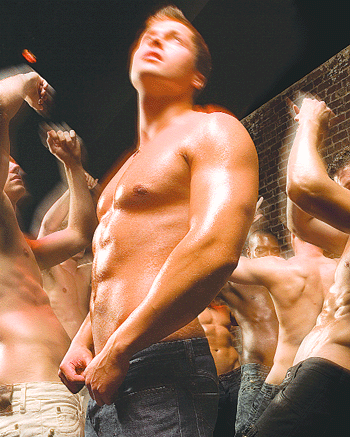The feisty New York theater festival turns 10 years young
If anyone had suggested to Elena K. Holy, when she co-founded FringeNYC, that she’d be celebrating the 10th anniversary of what is now the largest theater festival in North America, she would have shaken her head in abject disbelief.
What with the frantic fundraising, adjudicating applications, securing venues, and soliciting volunteers—all on a minuscule budget—many would have called it quits by now. Sure, as producing artistic director, she has plenty of help, but it’s mind-boggling how she continues to pull it off.
“It all somehow gets done,” said Holy, somewhat out of breath. “There are a million little miracles along the way. We’re always challenging ourselves, learning something new every year. I think that’s why I’m still here.”
In celebration of its 10th anniversary, FringeNYC is bringing back 10 shows from its illustrious past, handpicked based on critical excellence. They’re even holding class reunions so former participants—including, as Holy calls them, “lunatic fans”—from each year can commune and reminisce. “We consider it a huge gathering of the tribes, as it were,” Holy said. “It’s like opening a yearbook.”
The festival promises yet another edgy, dazzlingly diverse lineup of over 200 shows. You’ll find a glorious cauldron bubbling with surprises, including works by the late Wendy Wasserstein’s two nieces, a jukebox musical of Danny Elfman hits, and a comedy about Sapphic girl scouts by the author of the film “World Trade Center.”
While in the past Holy was quick to pinpoint new trends, this year she’s having trouble.
“2005 was the unofficial year of the gay marriage play,” Holy said. “Two years ago, with the Republican convention in town, political plays dominated the schedule. There’s no big issue this year.”
Ron Lasko, longtime promoter of FringeNYC, concurred: “This year is more noteworthy for a trend that vanished: recycled culture.” Lasko recalls that each year in the past, about a dozen or so shows have hinged on pop icons, spoofing “Scooby Doo,” “The Poseidon Adventure,” “Silence of the Lambs,” and “Showgirls” to name a few.
“Those were great shows, but we’ve reached the saturation point,” Lasko declared. “This year, there’s less sex, less gimmicks, and more intelligence. I guess you could say we’re getting back to the basics. And the quality of writing and production continues to upgrade.”
Lasko cited only two shows with blatant cultural references—“Reservoir Bitches,” an all-female “Reservoir Dogs,” and “Corleone” based on “The Godfather.”
While diplomacy disallows these organizers from playing favorites, a couple of shows with gay themes seemed to warrant their exuberance.
“Rainy Days and Mondays,” about boys addicted to circuit parties, was especially eye-opening for Holy. “It’s fascinating to look back at how that world evolved from the nineties to now,” she enthused. “What did I know from the circuit scene?”
Another standout is “Penguin Tango” by Steven Svoboda, who wrote and directed the 2004 Fringe hit, “Odysseus Died from AIDS.” The play was inspired from the true-life shenanigans of same-sex penguin pairings at the Brooklyn and Central Park zoos.
According to Holy, the so-called gay plays don’t just preach to the choir. “It’s silly to peg [“Penguin Tango”] as just for gays, just as we shouldn’t peg it as a penguin lover’s play either. It’s got universal appeal.”
Perhaps another reason why Holy has helmed the Fringe festival for so long is its rule-busting, maverick attitude.
“When you go to a Broadway show it’s a major event, expectations are high, and you have to choose carefully,” explained Holy. “At the Fringe, there’s a different energy not only because of our low ticket price, but the artistic spirit allows people to be more adventurous and see something they might not otherwise see. Here you can play it by ear—you have nothing to lose, except the 15 bucks.”
“All of our artists are highly motivated,” Holy continued. “Anybody you see working onstage or off are busting their backsides for no money. You have to be following your bliss, for lack of a better phrase. They have a strong desire to share their stories, their talents. Our audience falls in love with them and I do too.”
One of those bliss-chasers is Henry Ravelo, producer of “Rainy Days and Mondays.” “It’s a blessing to be here at the Fringe,” said Ravelo, who’s worked on projects with such luminaries as Judi Dench, Alan Alda, and Madonna. “They are extremely supportive, and the passion is palpable. It reminded me that theater is more than a business, it’s an art.”
When asked why so few shows seem to enjoy a life beyond the Fringe—recent exceptions include “Dog Sees God,” “Confessions of a Mormon Boy,” and “Dixie’s Tupperware Party”—Holy grew circumspect.
The expense required to bump up a production to that next level diffuses the initial inspiration; plus, the stakes are higher, and so are audience expectations.
And each year her job seems harder, as shows get more sophisticated and competition grows fiercer. In 2006, she helped judge over 800 applications received from all across the U.S. and far-flung countries as well.
“It’s beyond looking for quality,” admitted Holy. “It often comes down to passion, that spark. It’s like I’m an admissions officer at an elite college. It’s heartbreaking to turn away strong applicants.”
gaycitynews.com




































